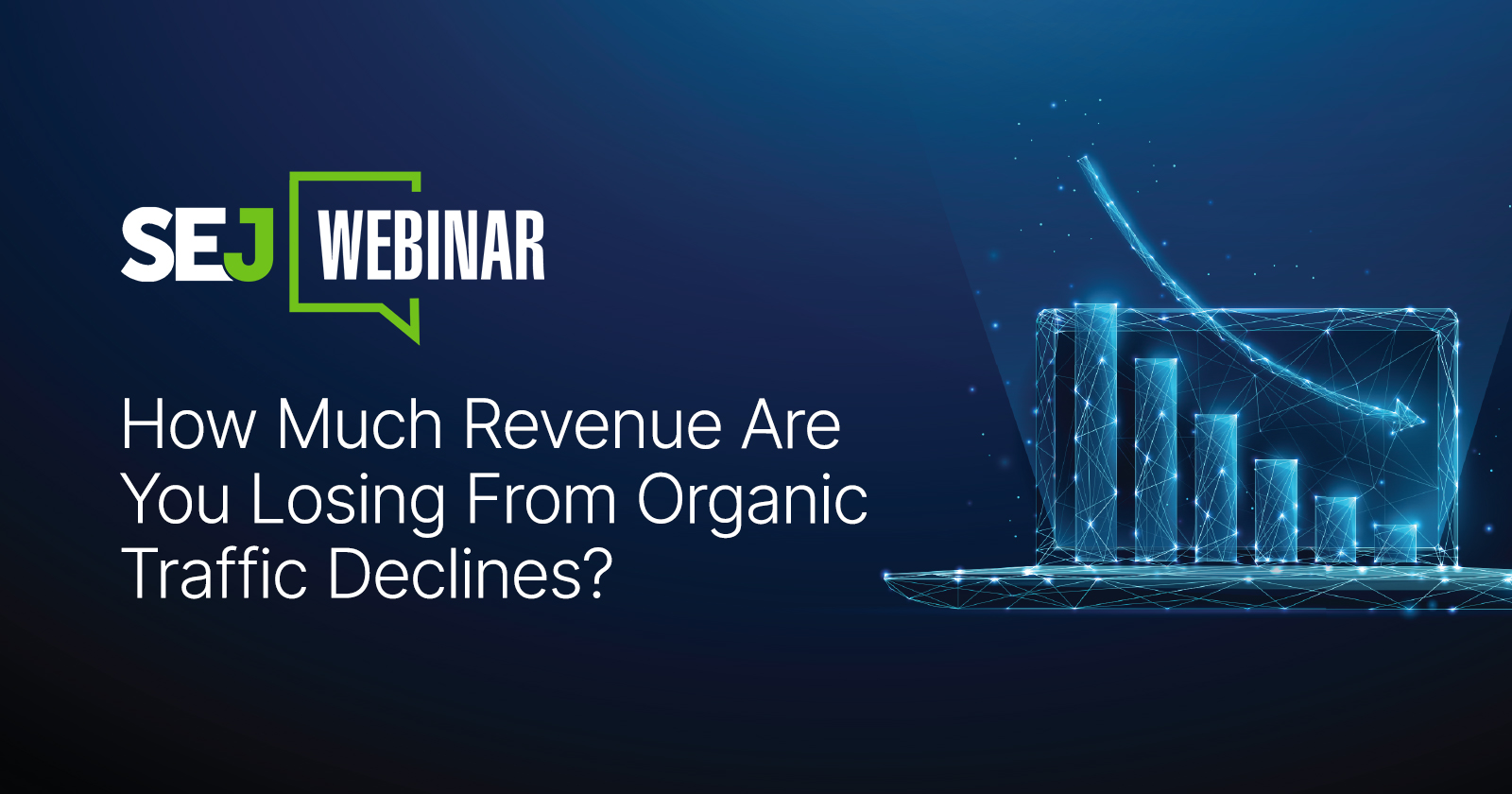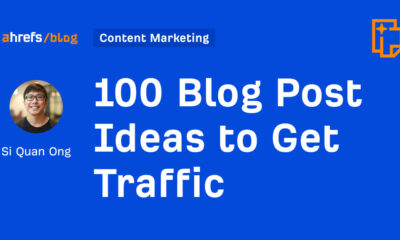SEO
How Much Revenue Are You Losing From Organic Traffic Declines?

Why is our traffic declining?
SEO professionals, marketers, business owners, and stakeholders have this same question and concern.
Traffic = customers = revenue. We all know it.
Managing your site more effectively, making more confident business decisions, and winning over stakeholders can all be achieved by understanding the source of traffic loss.
On March 16, I moderated a sponsored webinar presented by Wayne Cichanski, Vice President of Search & Site Experience at iQuanti.
He shared tips to help you diagnose traffic loss, discover what may have caused it, and determine how to address it.
Here is a quick summary of the webinar. To access the entire presentation, complete the form.
Uncover What Causes Traffic Drops
Most often, organic traffic declines are a combination of three triggers:
- Change in ranks.
- Change in volume.
- Change in CTR.
A general formula to take into consideration is:
Keywords(s) volume x CTR = Traffic
[See this formula in action] Instantly access the on-demand webinar →
The key is understanding the elements, the changes, doing the math, and moving forward to solve it.
How To Spot An Algorithmic Drop
Knowing how to spot an algorithmic drop gives you the power to communicate that to the stakeholders in the organization and guide your teams to take the necessary action.
Steady Decline Shows A Change In Authority
The common cause for a steady decline is a shift in authority.
Your site has either lost authority (links/referring domains) or your competition has gained authority.
[Learn what to keep an eye on] Instantly access the webinar →
Sharp Drops Mean An Algorithm Change
 iQuanti, March 2022
iQuanti, March 2022If your traffic is stable and then drops suddenly within a brief period, this shows an algorithm change.
[Learn what you should do] Instantly access the webinar →
Learn How To Calculate The Loss Of Revenue
Let’s take a look at this problem statement:
Page A normally gets 12,120 visits per month, but now only gets 7,244 which is a traffic decline of 59.7%.
Revenue loss during this period is $150,000.
When you sum all these together, you get attribution to what happened.
[Get the step-by-step on calculating revenue loss] Instantly access the webinar →
With the formula from the on-demand webinar, you’ll be able to more clearly explain know how much percentage in traffic drop came from ranks, volume, and CTR.
Being able to calculate the loss of revenue gives you the intelligence and insight you need to make those informed decisions and communicate properly with the stakeholders.
Or, if you are the stakeholder, you can now tell your team the direction you want to move forward based on what has cost you and what areas of the traffic have declined.
How To Recover Revenue
Understand what you can control and what you can’t.
Not all revenue can be recovered due to some elements out of your control.
- Ranks: Fixable
- Volume: Out of your control
- CTR: Difficult
[Find out why] Instantly access the webinar →
What To Do If Traffic Is Unrecoverable
After segmenting out the revenue loss by each contributing element, you can gain transparency on how much revenue you could hope to retrieve.
Here are some questions and action points you can consider.
- Did another internal page pick up the traffic?
- Where in the landscape did the volume shift to?
- Redefine the intent of the terms that dropped.
- Data mine net new volume.
[Dive deeper into recovery] Instantly access the webinar →
There will be a decline in traffic for almost every website, so it’s wise to be prepared.
[Slides] How Much Revenue Are You Losing From Organic Traffic Declines?
Here’s the presentation:
How Much Revenue Are You Losing From Organic Traffic Declines? from Search Engine Journal
Image Credits
Featured Image: Paulo Bobita/Search Engine Journal
SEO
Google Declares It The “Gemini Era” As Revenue Grows 15%

Alphabet Inc., Google’s parent company, announced its first quarter 2024 financial results today.
While Google reported double-digit growth in key revenue areas, the focus was on its AI developments, dubbed the “Gemini era” by CEO Sundar Pichai.
The Numbers: 15% Revenue Growth, Operating Margins Expand
Alphabet reported Q1 revenues of $80.5 billion, a 15% increase year-over-year, exceeding Wall Street’s projections.
Net income was $23.7 billion, with diluted earnings per share of $1.89. Operating margins expanded to 32%, up from 25% in the prior year.
Ruth Porat, Alphabet’s President and CFO, stated:
“Our strong financial results reflect revenue strength across the company and ongoing efforts to durably reengineer our cost base.”
Google’s core advertising units, such as Search and YouTube, drove growth. Google advertising revenues hit $61.7 billion for the quarter.
The Cloud division also maintained momentum, with revenues of $9.6 billion, up 28% year-over-year.
Pichai highlighted that YouTube and Cloud are expected to exit 2024 at a combined $100 billion annual revenue run rate.
Generative AI Integration in Search
Google experimented with AI-powered features in Search Labs before recently introducing AI overviews into the main search results page.
Regarding the gradual rollout, Pichai states:
“We are being measured in how we do this, focusing on areas where gen AI can improve the Search experience, while also prioritizing traffic to websites and merchants.”
Pichai reports that Google’s generative AI features have answered over a billion queries already:
“We’ve already served billions of queries with our generative AI features. It’s enabling people to access new information, to ask questions in new ways, and to ask more complex questions.”
Google reports increased Search usage and user satisfaction among those interacting with the new AI overview results.
The company also highlighted its “Circle to Search” feature on Android, which allows users to circle objects on their screen or in videos to get instant AI-powered answers via Google Lens.
Reorganizing For The “Gemini Era”
As part of the AI roadmap, Alphabet is consolidating all teams building AI models under the Google DeepMind umbrella.
Pichai revealed that, through hardware and software improvements, the company has reduced machine costs associated with its generative AI search results by 80% over the past year.
He states:
“Our data centers are some of the most high-performing, secure, reliable and efficient in the world. We’ve developed new AI models and algorithms that are more than one hundred times more efficient than they were 18 months ago.
How Will Google Make Money With AI?
Alphabet sees opportunities to monetize AI through its advertising products, Cloud offerings, and subscription services.
Google is integrating Gemini into ad products like Performance Max. The company’s Cloud division is bringing “the best of Google AI” to enterprise customers worldwide.
Google One, the company’s subscription service, surpassed 100 million paid subscribers in Q1 and introduced a new premium plan featuring advanced generative AI capabilities powered by Gemini models.
Future Outlook
Pichai outlined six key advantages positioning Alphabet to lead the “next wave of AI innovation”:
- Research leadership in AI breakthroughs like the multimodal Gemini model
- Robust AI infrastructure and custom TPU chips
- Integrating generative AI into Search to enhance the user experience
- A global product footprint reaching billions
- Streamlined teams and improved execution velocity
- Multiple revenue streams to monetize AI through advertising and cloud
With upcoming events like Google I/O and Google Marketing Live, the company is expected to share further updates on its AI initiatives and product roadmap.
Featured Image: Sergei Elagin/Shutterstock
SEO
brightonSEO Live Blog

Hello everyone. It’s April again, so I’m back in Brighton for another two days of Being the introvert I am, my idea of fun isn’t hanging around our booth all day explaining we’ve run out of t-shirts (seriously, you need to be fast if you want swag!). So I decided to do something useful and live-blog the event instead.
Follow below for talk takeaways and (very) mildly humorous commentary. sun, sea, and SEO!
SEO
Google Further Postpones Third-Party Cookie Deprecation In Chrome

Google has again delayed its plan to phase out third-party cookies in the Chrome web browser. The latest postponement comes after ongoing challenges in reconciling feedback from industry stakeholders and regulators.
The announcement was made in Google and the UK’s Competition and Markets Authority (CMA) joint quarterly report on the Privacy Sandbox initiative, scheduled for release on April 26.
Chrome’s Third-Party Cookie Phaseout Pushed To 2025
Google states it “will not complete third-party cookie deprecation during the second half of Q4” this year as planned.
Instead, the tech giant aims to begin deprecating third-party cookies in Chrome “starting early next year,” assuming an agreement can be reached with the CMA and the UK’s Information Commissioner’s Office (ICO).
The statement reads:
“We recognize that there are ongoing challenges related to reconciling divergent feedback from the industry, regulators and developers, and will continue to engage closely with the entire ecosystem. It’s also critical that the CMA has sufficient time to review all evidence, including results from industry tests, which the CMA has asked market participants to provide by the end of June.”
Continued Engagement With Regulators
Google reiterated its commitment to “engaging closely with the CMA and ICO” throughout the process and hopes to conclude discussions this year.
This marks the third delay to Google’s plan to deprecate third-party cookies, initially aiming for a Q3 2023 phaseout before pushing it back to late 2024.
The postponements reflect the challenges in transitioning away from cross-site user tracking while balancing privacy and advertiser interests.
Transition Period & Impact
In January, Chrome began restricting third-party cookie access for 1% of users globally. This percentage was expected to gradually increase until 100% of users were covered by Q3 2024.
However, the latest delay gives websites and services more time to migrate away from third-party cookie dependencies through Google’s limited “deprecation trials” program.
The trials offer temporary cookie access extensions until December 27, 2024, for non-advertising use cases that can demonstrate direct user impact and functional breakage.
While easing the transition, the trials have strict eligibility rules. Advertising-related services are ineligible, and origins matching known ad-related domains are rejected.
Google states the program aims to address functional issues rather than relieve general data collection inconveniences.
Publisher & Advertiser Implications
The repeated delays highlight the potential disruption for digital publishers and advertisers relying on third-party cookie tracking.
Industry groups have raised concerns that restricting cross-site tracking could push websites toward more opaque privacy-invasive practices.
However, privacy advocates view the phaseout as crucial in preventing covert user profiling across the web.
With the latest postponement, all parties have more time to prepare for the eventual loss of third-party cookies and adopt Google’s proposed Privacy Sandbox APIs as replacements.
Featured Image: Novikov Aleksey/Shutterstock
-
SEARCHENGINES6 days ago
Daily Search Forum Recap: April 19, 2024
-

 WORDPRESS6 days ago
WORDPRESS6 days ago13 Best HubSpot Alternatives for 2024 (Free + Paid)
-

 MARKETING6 days ago
MARKETING6 days agoBattling for Attention in the 2024 Election Year Media Frenzy
-

 WORDPRESS6 days ago
WORDPRESS6 days ago7 Best WooCommerce Points and Rewards Plugins (Free & Paid)
-

 MARKETING5 days ago
MARKETING5 days agoAdvertising in local markets: A playbook for success
-

 SEO6 days ago
SEO6 days agoGoogle Answers Whether Having Two Sites Affects Rankings
-

 SEARCHENGINES5 days ago
SEARCHENGINES5 days agoGoogle Core Update Flux, AdSense Ad Intent, California Link Tax & More
-

 AFFILIATE MARKETING6 days ago
AFFILIATE MARKETING6 days agoGrab Microsoft Project Professional 2021 for $20 During This Flash Sale
















You must be logged in to post a comment Login